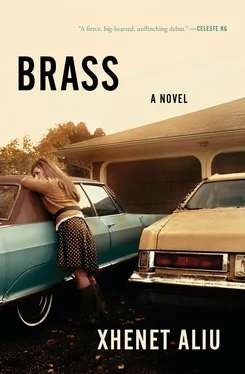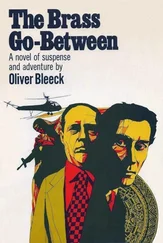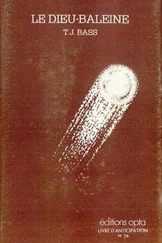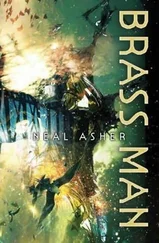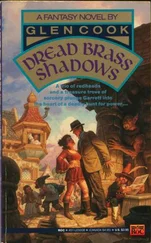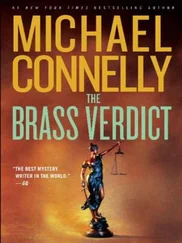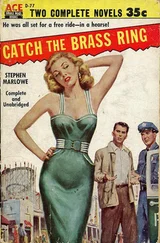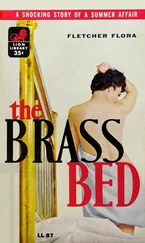“Shows how much you know,” she said.
With that I almost retched again. I wondered if there was a chance she was right, because if Mamie could speak with authority about anything, it was hangover remedies and getting knocked up by accident. But it was impossible; that broken condom incident was weeks ago. I’d stopped freaking out about it after a few days, once I convinced myself that the taupe oval on my underpants was a light period and not an old period stain. I hadn’t even introduced Bashkim to Mamie or Greta, I hadn’t even gotten that birthday necklace he promised me yet.
“No, I’m not pregnant,” I said again.
“Who is this guy, anyway?”
I thought for a second and realized I didn’t really know how to answer that question. Mamie wasn’t going to like that he was a foreigner, unless he was Lithuanian like Bobu and Grandpa, because once her parents made it into the U.S. the whole family assumed every other immigrant was just there to mooch off the system. But Bashkim was a hard worker, which she’d be okay with, especially since the thing he worked hard at was manual, thankless, low-paying labor, and Mamie didn’t trust any other kind. He was married: that was a bad thing. He dreamed of a better life: also a bad thing. Anyway, once I made it through high school without getting knocked up she stopped being interested in who I was dating, so none of that seemed worth mentioning.
“Just some guy I work with,” I said.
“Well,” she said. “Sounds like a winner.”
“I mean, he’s more than just that.”
“What is he, then?”
I pulled the afghan from the back of the sofa and wrapped it around my shoulders. The afghan wasn’t finished, one of Mamie’s monthlong hobbies, so you had to choose the part of you that felt the coldest, then move it to the other parts later. It didn’t help much, but it helped more than nothing at all.
“He has a really broad chest. It looks like he’s been breaking horses,” I said, finally, during the commercial break. “And nice eyes.”
“Oh Christ,” Mamie said. “You’re done for.”
She was seventeen when she’d had me. I’d seen a picture of her eight months along, in a bikini, cannonballing off a dock at Scovill’s Dam. Dad used a cooler as a bench, his denim shorts soaked because he’d already taken his turn, maybe shown her how to land just so in the water to make the biggest splash. He held a can of Schaefer in his hand, but he hadn’t yet drunk enough of it for his belly to be swollen with a half keg, the way it looked in pictures taken a few years later. His arms were swollen instead, biceps that were ready to be used, one of them tattooed with a cobra, its head puffed out at the widest part of his arm.
“Anyway,” I said.
“We don’t even have a flight of stairs to throw yourself down,” Mamie said.
“I’d probably just break a leg anyway, with my luck,” I said. Then I’d have to ask Bashkim for help, and it was not the right time for that, with his mind on his money in another part of the world. Sometimes I understood what a burden I could be, and why I seemed to line Bashkim’s blue eyes red, which really just made them prettier, those two primary colors dueling with each other.
Mamie had blue eyes, too. According to the Punnett squares in biology class, if I had an offspring with a blue-eyed man, it’d have a 25 percent chance of having blue eyes, too.
But I wasn’t pregnant, I reminded myself, so never mind about that.
“I don’t know what happened to you two. I really don’t,” Mamie said. She was looking at Greta’s latest progress report from the school social worker, and apparently progress wasn’t really the right word to use to describe how she was doing.
“No idea?” I said.
“I don’t know who’s worse. Your sister tests like a genius, and look at her, pulling her hair out in chunks like a crazy person. I mean, I broke the vacuum following her around. The thing literally choked on hair.”
“It’s a sickness. She can’t help it.”
“She can’t help being sick, you can’t help being sick. I don’t know how I’m supposed to help it. There comes a point, you know?”
“When?” I said. “When does the point come?”
Mamie looked at me. The television had gone dim for a moment, so she was half-shadowed, her right eye just a dark socket, the jawline of her square face an abyss. She looked beautiful and harsh like that, in a way fashion photographers try to stage.
“What are you talking about?” Mamie said. “You really must have a fever.”
I nodded, draped the afghan over the back of the couch, and headed off to bed.
By morning, I was seized with sickness, though there was no fever to break, and it hurt me to think she might be right. I might have gone and gotten myself pregnant.
Once upon a time, before school administrators were gently persuaded to reconsider their annual superlative categories, you’d swept the A.M. Kindergarten Award Day, taking home construction-paper blue ribbons in the prime categories of Prettiest, Nicest, Smartest, and something else—you can’t remember the last one, but you’re sure it was a good one, and that your prizes totaled four, one for each of the still-gangly skinny girl limbs you kept until approximately age nine. At recess on at least two occasions, different boys grabbed on to your arms and declared Mine!, No, mine!, and because this was years before third-wave feminism blogs and because their testes were still years from dropping, it was flattering and exhilarating. You sat daily in a pod with Miguel, Latoya, and Samantha, imagining the world was made of the Cool Ranch Doritos on which you wished to subsist entirely, and you never bothered to disrupt the fantasy to voice your fear that this world would literally crumble and become overrun with cockroaches, the creatures that had chased you and your mother out of two previous apartments before you landed in the one it seemed like you’d never get to leave. And anyway, you didn’t even need a fantasy Dorito world. Your real world was amazing. It was perfect. You were warm and stuffed with blocks of melted, delicious government-surplus cheese, your mother let you watch all the television you wanted, you were admired and respected but not feared by your classmates, and your teachers were sure they’d read about you in the paper years later, in one of the good Civic sections, surely, not the police blotter, where they were equally sure they’d read about some of your peers.
You don’t remember one moment where it all ended, though by the time you’d had your first menstrual period, at age eleven, your glory days were long over. It wasn’t like an explosion had rocked the school and sent you all flying up into the air and landed you down in a place where you surely were not meant to be, estranged from your friends and ignored by teachers who felt they didn’t need to worry about you and thus didn’t. There wasn’t one specific day where Miguel up and left to run exclusively with a crew of Puerto Rican boys, and Latoya with black girls, and Samantha, who was a white girl like you, with one black boy at a time.
In the end, you managed to keep one friend, Teena, who isn’t a friend so much as a carpool partner. She’s willing to drive you around to places on nights when she isn’t being driven around herself by twenty-something-year-old mall security guards in their creepy white vans or douchey Mitsubishis. You two are stuck together because she, like you, has been rejected by all the other girls you know. Unlike you, she’s been rejected because she’s been branded a superslut—really, she’s only a standard slut, not nearly as bad as the jealous girls who tend to call her that—and also unlike you, she truly does not give a shit what people have to say about it. It hasn’t yet occurred to you how awesome and advanced a thing like that is, something that aging actresses say in interviews came to them in their forties. For the time being, you’re still seventeen and kind of embarrassed to be seen with Teena at school. Since your plan is to go to Pandora’s Box, a.k.a. the Betsy Ross Diner, however, you’re happy to be with a friend who attracts the kind of attention you secretly want but from which you typically flee.
Читать дальше
